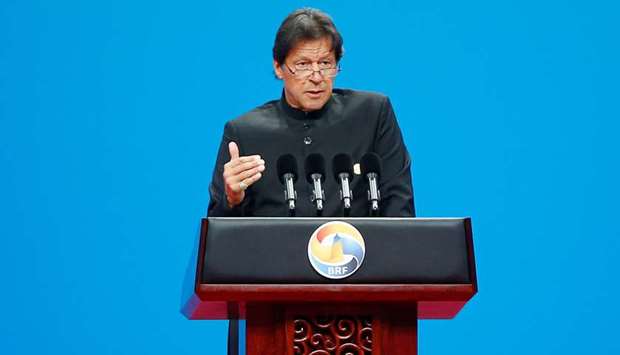Prime Minister Imran Khan has emphasised international co-operation in the fight against Covid-19, the disease caused by the coronavirus, as he wished speedy recovery to Britain’s Prime Minister Boris Johnson and Prince Charles, the Prince of Wales and heir to the British throne, both of whom have been infected.
“I wish HRH Prince Charles @ClarenceHouse and PM @BorisJohnson speedy recovery, good health and long life. This deadly virus #Covid-19 has hit people beyond borders. We need an internationally co-ordinated response to counter it,” Khan tweeted with the hashtag #TogetherWeCan.
Johnson tested positive for Covid-19 on Friday, shortly after participating in the extraordinary G20 Summit held through video-conferencing to discuss ways for confronting the raging pandemic.
Prince Charles had on Wednesday disclosed that he was infected with coronavirus.
Both British leaders are having mild symptoms and are currently in self-isolation.
Johnson continues to work from home, while Prince Charles is self-isolating at a royal estate in Scotland.
Britain has been badly hit by the surging infection.
The death toll from the viral infection in the UK rose to 1,019 on Saturday, an increase of 260 over Friday marking the single day largest jump in the number of dead. There were at least 17,089 confirmed cases.
Earlier, Foreign Minister Shah Mahmood Qureshi with British Secretary of State for Foreign and Commonwealth Affairs Dominic Raab to discuss the global pandemic and prospects of enhanced bilateral co-operation for tackling the problem.
Qureshi also expressed concern over the continuing communication blackout in India-administered Kashmir, which is depriving 8mn Kashmiris of critical information and essential medical supplies needed to effectively contain the pandemic.
He also reiterated the need to lift sanctions against Iran, enabling it to utilise its resources to save human lives.
The minister highlighted that debt relief for developing countries, like Pakistan, would enable them to devote greater resources to fight the pandemic and mitigate its economic fallout.
Yesterday Pakistan’s coronavirus infections continued to increase, with the addition of 121 new cases.
Pakistan now has 1,526 cases of the coronavirus.
Thirteen people have died so far of the Covid-19 disease, according to Special Assistant to the Prime Minister on Health Dr Zafar Mirza.
The health minister said that 71% of coronavirus cases in Pakistan are imported, mainly pilgrims who returned from Iran.
Pakistan’s coronavirus infections have been increasing steadily in the past week, despite the imposition of a lockdown in the country.
Politicians and experts have expressed fears of an exponential increase in the coming days and asked the government to test more people.
“The data coming in of patients across the country is not indicative of the true picture. The real number of patients is much higher,” said Attaur Rheman, head of the prime minister’s task force on science and technology.
The health ministry said that there were 13,324 suspected cases.
More than 8,000 are in quarantine across the country.
Pakistan’s authorities have sealed the country’s land borders, suspended domestic and international flights and introduced a nationwide lockdown, which is being enforced by the police and army, to control the spread of the virus.
Yesterday health minister Mirza revealed that Pakistani students who were stranded in the Chinese city of Wuhan, during the peak of the country’s Covid-19 outbreak, are now thanking the government for not evacuating them.
Briefing a team of doctors from China at the National Institute of Health (NIH) in Islamabad, he said: “We decided – it was a tough decision for us – against evacuating our students from Wuhan. We worked very closely with the Chinese government and followed their recommendations.
“Today, now that the disease is spreading in Pakistan, the same students are thanking the government for not evacuating them and requesting us to take care of their families in the same way they were looked after by the Chinese government.”
He said that when President Dr Arif Alvi, Foreign Minister Qureshi, and Planning Minister Asad Umar visited China recently, they spoke with the students in Wuhan via Skype.
“They [the students] thanked the president and said that the decision [to not bring them back] was the right thing to do, even though their families were pressuring the government to do so,” he added.
The health minister went on to say that China has written a new chapter in the history of public health by putting approximately 60mn of its people under lockdown.
“The world has a lot to learn from China regarding the prevention and control of communicable diseases,” he said.
Expressing his gratitude to the Chinese government for their co-operation by providing medical supplies and expertise during this difficult time, Mirza said: “It is truly remarkable that out of all the cases reported in Pakistan, not a single patient has a travel history to China.”
“This was only achieved through co-operation and coordination between the two countries,” he said.
Earlier, NIH executive director Major-General Aamer Ikram welcomed the Chinese delegation and briefed them about the coronavirus outbreak in the country.
He said that all of NIH’s departments are co-ordinating national response activities for Covid-19, adding that China has once again shown to the world that it is Pakistan’s ally.
After the briefing, the delegation visited the different departments at the NIH and discussed techniques they had used to combat the spread of the coronavirus in their country.

Prime Minister Khan: This virus has hit people beyond borders. We need an internationally co-ordinated response to counter it.
